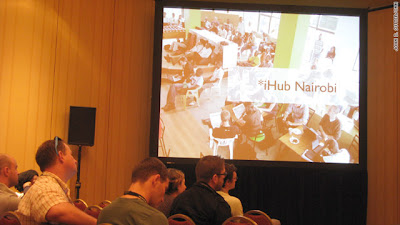People don't usually put Africa and technology in the same sentence. But when it comes to mobile tech – like using text messages and stripped-down mobile phones to communicate, make financial transactions, map communities and pull information from the mobile internet - Africa is proving to be a hotbed for tech innovation.
This African tech renaissance, which seems to be most pronounced in Kenya, South Africa and Nigeria, was the subject of a panel on Sunday at South By Southwest Interactive, this sometimes-contrarian tech festival in Austin, Texas.
This African tech renaissance, which seems to be most pronounced in Kenya, South Africa and Nigeria, was the subject of a panel on Sunday at South By Southwest Interactive, this sometimes-contrarian tech festival in Austin, Texas.
Panelists listed several examples of where Africa is pushing ahead of the Western world in mobile technology. Here's a look at a few of the highlights:
- Mobile payments: Mobile phones have become one of the main ways Kenyans exchange money and pay for goods and services. By one account, 10% of Kenya's GDP is exchanged over mobile payment systems. Compare that to the United States, where payments via smartphone are just now starting to catch on via Starbucks apps and the like.
- Check-ins: Check-in apps are just gaining steam in the United States, but the idea of using text messages to share location info is old hat in Africa, said Nic Haralambous, founder of Motribe.com. “We were doing check-ins before Foursquare was a thought. We were doing location before Foursquare knew what location was,” he said.
- Crowd mapping: Ushahidi, a crowd-mapping platform that was used to aid relief efforts after the 2010 Haiti earthquake, originated in Nairobi, Kenya, after an election crisis in 2008. The idea is pretty simple: People on the ground in a disaster situation send in text message reports that are tagged by location. Then an army of volunteers adds in geo-tagged tweets and plot those data points on a map. This helps rescue workers know in real-time where to direct their efforts. The idea has been credited with saving lives. And there are other projects too. Panelists highlightedVoiceofKibera.org, where residents of one of Kenya's slums used phones to literally put their home on the map. Before, Kibera was just a "blank spot," said Ushahidi's Brian Herbert.

No comments:
Post a Comment